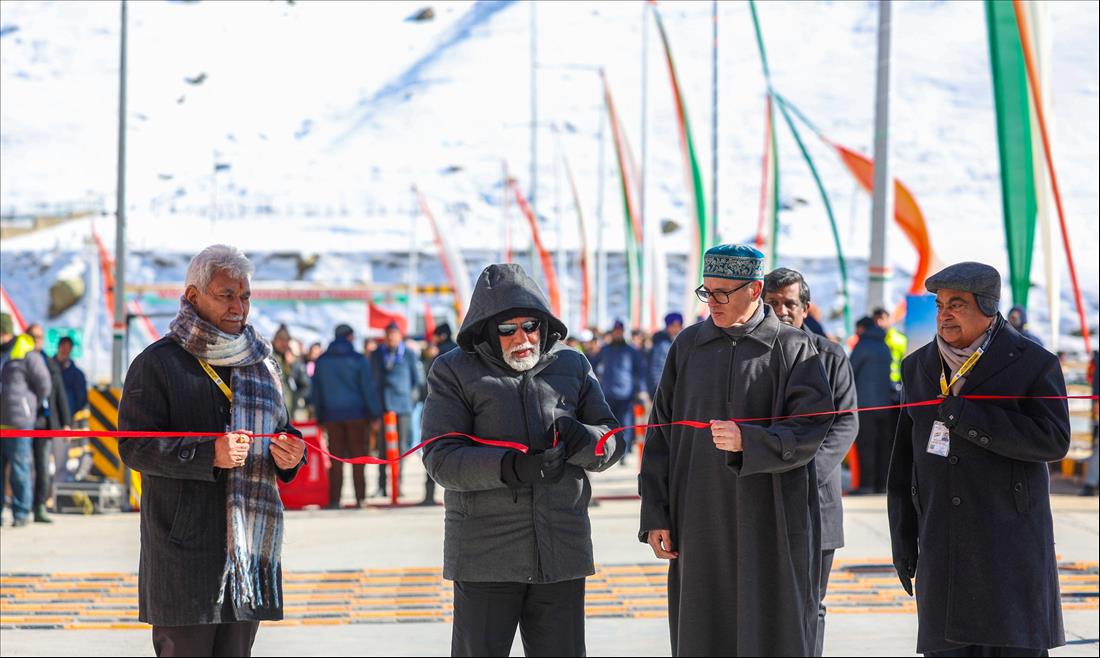
Omar's Tough Balancing Act
PM Narendra Modi with Chief Minister Omar Abdullah during the inauguration of the Z-Morh tunnel, in J&K.
When Chief Minister Omar Abdullah delivered his address during the prime minister Narendra Modi's inauguration of Z-Morh tunnel on January 13, the contrast with the late chief minister Mufti Muhammad Sayeed's speech during PM Modi's visit in 2015 couldn't have been starker. Mufti then sought an Indo-Pak dialogue and resurrection of Vajpayee-Musharraf peace process, and Omar sought restoration of statehood to the now union territory of Jammu and Kashmir. Mufti's tone was assertive and Omar's conciliatory. But there's hardly any scope for value judgement here. Between the context of the two speeches, their tone and tenor, there is a world of difference: Mufti was the chief minister of a constitutionally empowered state of Jammu and Kashmir including Ladakh and Omar that of a union territory where his elected government is subservient to Lieutenant Governor. And there's little that he can do without the cooperation of the central government and the LG.
What's more, the BJP is the largest opposition party in the Assembly with 29 seats. Backed by its government at the centre, the party will always be looking for an opening to form the government. Only thing that prevented the saffron party from forming the government in the union territory was that the voters in Kashmir largely rallied around the National Conference that got 42 seats. The NC-Congress-CPI(M) have 49 seats between them. And in the event of any unlikely defection in the NC in future, the BJP could very well be forming J&K's first Jammu-dominated elected government, led probably by a Hindu chief minister. However, even otherwise, the BJP-led central government is a de-facto ruler in the existing hybrid arrangement with power being shared between the Lieutenant Governor Manoj Sinha and the NC-Congress alliance – albeit unequally in favour of the former. The arrangement suits the BJP and it may prefer to stick with it for an indefinite time. This reality is likely to keep the NC-led government's urge to assert itself in check, lest it antagonize the centre.
ADVERTISEMENTThis has drastically narrowed the maneuvering space of the NC government. And it is unlikely to change as long as the BJP remains a dominant force at the centre, and which looks certain until an indefinite period. In fact, the chances are that the party may become even stronger in near future. Assembly elections in New Delhi and Bihar will be keenly watched. The BJP will try to win New Delhi and retain the Nitish-led government in Bihar. Both prospects look very much possible, more so after the saffron party's stunning win in Maharashtra. Over the past decade, the BJP has recurrently sneaked from behind to snatch electoral victories from the jaws of defeat, like in Haryana and Maharashtra. So much so that this has made it challenging to take the party's setbacks at their face value.
ADVERTISEMENTOn the contrary, the opposition INDIA Bloc which got some wind back in its sails following a surprising turnaround in the Lok Sabha polls has again lost its momentum. Maharashtra loss has already caused rumblings within the bloc. Another electoral loss, and the alliance could come apart at the seams. This puts the elected J&K government apparently allied to the opposition alliance on a sticky wicket. It is not a part of the ruling BJP but is reliant on it for everything. And the BJP, which is a condescending benefactor here, will hardly make things easier except on its terms. The saffron party would also be loathe to alter this favourable arrangement by granting an early statehood to J&K. More so, when there also are far bigger reasons to withhold it. Centre, it is believed, is unlikely to let go of control on the security agencies and the allied security related matters, lest it unravel the gains made in recent years. The recent rise in militancy-related violence is likely to further dissuade the central government from handing over complete control over the region to an elected government. Should this happen, a future governor will continue to wield a strong say in the affairs of J&K.
There's thus little hope that statehood will be restored anytime soon. Although Omar did ask for its reinstatement at Z-Morh event, and the prime minister did assure him of his promise to do so, little is expected to change. For example, the prime minister in his speech once again stayed short of a timeline, nor did he specifically mention statehood.
Read Also R-Day Reminder Of Freedom Fighters' Sacrifice: Omar J&K CM Gets Official X HandleThat said, it will be politically unsustainable for Omar to continue to play the role of a conciliatory and subservient chief minister. Already his praise for the PM has lent some ammunition to his opponents in the Valley, who have termed it an appeasement of the BJP that goes contrary to the spirit of his anti-Hindutva mandate. Also, while people in the Valley have generally been understanding of the CM's predicament, his Z-Morh speech was seen as a little more yielding than needed. It makes Omar's job challenging, requiring him to perform a delicate balancing act – appeasing the Centre to ensure his government's survival while addressing the sentiments of his core constituency still reeling from the loss of Article 370 and downgrading of the once empowered state.
-
Views expressed in the article are the author's own and do not necessarily represent the editorial stance of Kashmir Observer

Legal Disclaimer:
MENAFN provides the
information “as is” without warranty of any kind. We do not accept
any responsibility or liability for the accuracy, content, images,
videos, licenses, completeness, legality, or reliability of the information
contained in this article. If you have any complaints or copyright
issues related to this article, kindly contact the provider above.

















Comments
No comment